DSolve[y''[x] + (1 - (l (l + 1))/x^2 + 2/x) y[x] == 0, y[x], x]
(*{{y[x] ->
C[1] WhittakerM[-I, 1/2 (1 + 2 l), 2 I x] +
C[2] WhittakerW[-I, 1/2 (1 + 2 l), 2 I x]}}*)
without any restrict for $l$ or $x$ or $y$.
This general solution offers the integration factors for matching the first requirement:
Table[Limit[
D[FunctionExpand[WhittakerW[-I, 1/2 (1 + 2 l), 2 I x]], x],
x -> 0], {l, 1, 10, 1}]

Table[Limit[D[FunctionExpand[WhittakerM[-I, 1/2 (1 + 2 l), 2 I x]], x],
x -> 0], {l, 1, 10, 1}]
(*{0, 0, 0, 0, 0, 0, 0, 0, 0, 0}*)
Table[Limit[D[FunctionExpand[WhittakerM[-I, 1/2 (1 + 2 l),2 I x]], x],
x -> 0], {l, -10, 0, 1}]
(*{0, 0, 0, 0, 0, 0, 0, 0, 0, 0, 1}*)
Table[Limit[(l + 1) FunctionExpand[
WhittakerM[-I, 1/2 (1 + 2 l),2 I x]/x], x -> 0], {l, 1, 10, 1}]
(*{0, 0, 0, 0, 0, 0, 0, 0, 0, 0}*)
Table[Limit[(l + 1) FunctionExpand[
WhittakerM[-I, 1/2 (1 + 2 l),2 I x]/x], x -> 0], {l, -10, 0, 1}]
(*{ComplexInfinity, ComplexInfinity, ComplexInfinity, ComplexInfinity, \
ComplexInfinity, ComplexInfinity, ComplexInfinity, ComplexInfinity, \
ComplexInfinity, Indeterminate, 1}*)
$$
\lim_{x\rightarrow 0} f'\left(x\right) =(\ell +1)\left(\frac{f (x)}{x}\right)
$$
has not the power to give more information than that l<=0 give no contribution at x==0 to the solution. This condition can be satisfied!
The asymptotic behaviour can be treated with AsymptoticDSolveValue:
lsol1=AsymptoticDSolveValue[{y''[x] + (1 - (l (l + 1))/x^2 + 2/x) y[x] ==
0}, y[x], {x, 0, 1}]

AsymptoticDSolveValue[{y''[x] + (1 - (l (l + 1))/x^2 + 2/x) y[x] ==
0}, y[x], {x, 0, 3}]
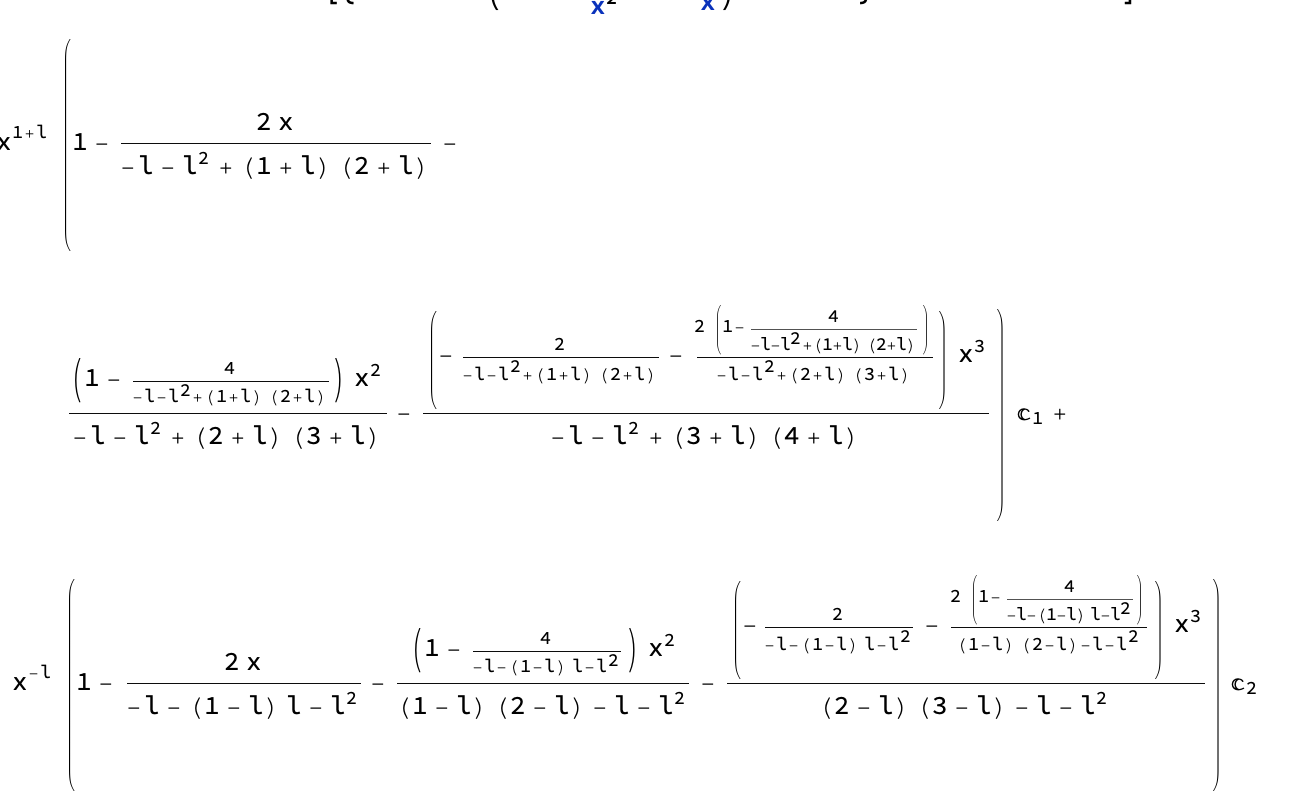
is again independent of values for x and l. But the contributions from the integration constant c2 have to be discarded.
Table[(lsol1 /. C[2] -> 0)/x // FullSimplify, {l, 1, 10, 1}]

This is already very close to the asymptotic result:
Table[((l + 1) lsol1 /. C[2] -> 0)/x // FullSimplify, {l, 1, 10, 1}]

Table[(((l + 1) lsol1 /. C[2] -> 0)/x // FullSimplify) /. x -> 0, {l,
1, 10, 1}]
(*{0, 0, 0, 0, 0, 0, 0, 0, 0, 0}*)
This matches already the result in the closed-form.
$$
\lim_{x\rightarrow \infty }f(x) =\frac{1}{2 i}\left(e^{i x}-e^{-(i (x-\pi \ell ))}\right).
$$
Can be solved in Mathematica with
FunctionExpand[WhittakerM[-I, 1/2 (1 + 2 l), 2 I x]]
From the discussion near x==0 the parameter c2==0 solves the problem. But it got clear that this solution diverges strong to infinity.
So for the solution for very large x C2 has to be zero!
To get a first impression l==1:
ReImPlot[{Re@
FunctionExpand[WhittakerM[-I, 1/2 (1 + 2 1), 2 I x]], (3/(
2 I) (E^(I x) - E^(-I ( x - 1 π))))}, {x, 0, 35},
PlotRange -> Full]
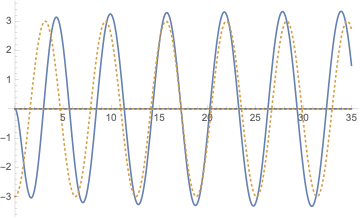
Examples that sustain the hypothesis are
ReImPlot[{FunctionExpand[
WhittakerM[-I, 1/2 (1 + 2 2), 2 I x]], (30/(
2 I) (E^(I x) - E^(-I ( x - 2 π))))}, {x, 1335, 1355},
PlotRange -> Full]
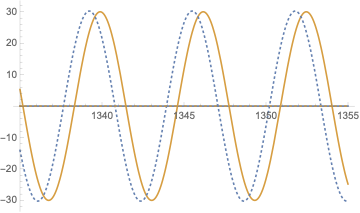
ReImPlot[{FunctionExpand[
WhittakerM[-I, 1/2 (1 + 2 3), 2 I x]], (-400/(
2 I) (E^(I x) - E^(-I ( x - 3 \[Pi]))))}, {x, 1335, 1355},
PlotRange -> Full]
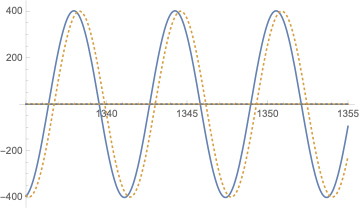
This has close relevance to be true.
The is the Wolfram function repository https://functions.wolfram.com/ that kind of help:
symptotic series expansions (6 formulas)
From that this
asymptotic approximation
seems to the the most interesting:
$$
M_{\nu ,\mu }(z)\propto \Gamma (2 \mu +1) \left(\frac{e^{z/2} \left(O\left(\frac{1}{z}\right)+1\right) z^{-\nu }}{\Gamma \left(\mu -\nu +\frac{1}{2}\right)}+\frac{e^{-\frac{z}{2}} \left(O\left(\frac{1}{z}\right)+1\right) \left(z^{\mu +\frac{1}{2}} (-z)^{-\mu +\nu -\frac{1}{2}}\right)}{\Gamma \left(\mu +\nu +\frac{1}{2}\right)}\right)/;(\left| z\right| \to \infty)
$$
With the parameters from Your question:
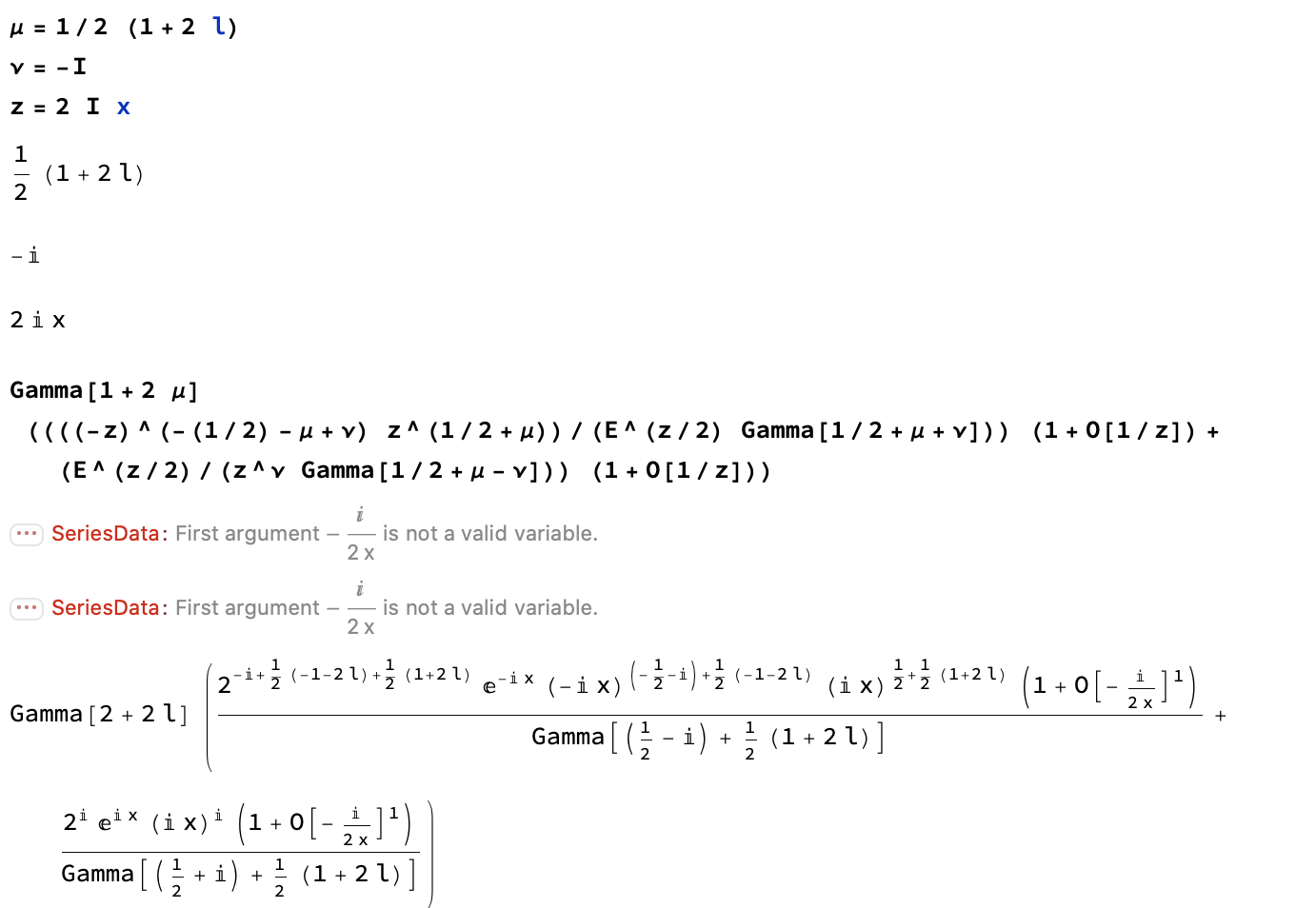
This has the two summands with the exponential function, but not the phase at first glance.
Thanks for Your interest. Hope this provides best advances.










AsymptoticwithAssumptions -> x > 0 && l >= 0 && l ∈ Integersto the analytical solution atx ->0andx -> Infinity. Note, however, that I tried doing so and ran into numerous complications. $\endgroup$